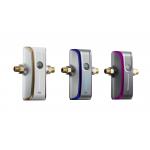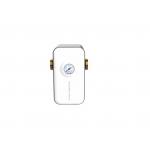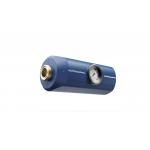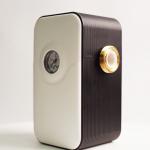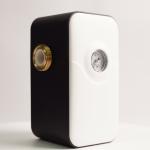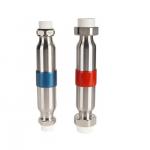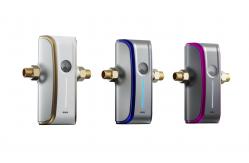Water Descaler System Vertical Installation Water Descaler Softener
What is a water softener?
A water softener is a whole-house filtration system that removes
hardness-causing calcium and magnesium minerals from your water
through a process called ion exchange. A water softener addresses
one of the most prevalent and devastating water problems: hard
water. Hard water wreaks havoc on the modern home. Scale builds up
in your pipes, clogging them and decreasing water pressure. Scale
dramatically shortens the lifespan of appliances like dishwashers,
coffee makers and ice machines. Hard water destroys hot water
appliances. The higher the temperature of the water, the more
calcium and magnesium will solidify and harden into solid deposits
inside your hot water heater. If you live in hard water territory,
it can sound like your water heater is popping popcorn. This is
because scale has attached itself to the heating element. As the
temperature of the heater rises and the tank expands, the calcified
rock deposits crusted on the heating elements start cracking and
stretching. Hard water-induced scale is the culprit of that popcorn
popping sound.
Without a water softener, laundry demands extra detergent to
prevent it from looking dingy. Dishes will come out of your
dishwasher streaked and stained. Filmy scum builds up on your
shower curtains and your soap and shampoo will not lather. Bathing
in hard water leaves your skin itchy and dry and your hair lifeless
and sticky. The sheer amount of time, energy, and money required to
clean up the detrimental side effects of hard water is dizzying. A
whole house water softener is the solution to the scourge of water
hardness.
How does a water softener work?
A water softener removes calcium and magnesium from water through a
process called ion exchange. When the hard water enters into the
mineral tank, it flows through a bed of spherical resin beads.
These plastic beads, usually made from polystyrene, are charged
with a sodium ion. The resin beads are anions, meaning they have a
negative charge. The calcium and magnesium minerals have a positive
charge, making them cations. Since opposite charges attract, the
negative charge of the minerals is attracted to the positive charge
of the resin beads. As the hard water passes through the resin, the
beads grab ahold of the mineral ions and remove them from the
water. When the bead seizes the mineral ion, the sodium ion is
released. The column of resin strips all the hardness out of the
water as it passes through the mineral tank, and softened water
flows out into your home.
| Learn more about the effects of hard water. |
Product Feature:
- No electricity is required.
- Easy installation, maintenance-free.
- Unlimited household water pressure.
- Safe and environmentally friendly, with no chemical substances.
- Suitable for long-term use.
- Compatible with any water heater.
- No need to descale the tank heater.
| Product Size | 30x10x10CM (Package) |
| Gross Weight | 1.26 Kgs |
| Installation Method | Screw In |
| Usage | Briskspring water softener only not solves the hard water problem
but also demolishes the scale accumulated in the equipment or
pipeline and degerming |
| Flow Rate | 4 Tons Per Hour |
| Color | Golden |
| Fitting Material | 59-1 Brass |
Central Water Softener
The chip is made of SAAS material with a proprietary invention
patent and is in a sheet shape.
It is designed into the shape of the turbine with two opposite
nozzle directions inside and outside,
which not only ensures that the material is not wasted but also has
sufficient flow area to ensure that the water flow directly impacts
the chip surface when passing through the chip.
Is soft water safe to drink?
Yes, soft water is safe to drink. During the ion exchange process,
the resin beads do release sodium into the water when grabbing
ahold of the hardness minerals. But the amount of sodium in
softened water isn’t unhealthy, and actually is far less than what
is widely imagined. If you have moderately hard water, for example
five grains per gallon (about 86ppm), that’s only adding 37
milligrams of sodium per quart of water. That’s less than 2% of the
suggested daily sodium intake. A slice of white bread has around
170 milligrams of sodium, and a slice of pizza has about 640
milligrams. So, comparatively, the amount of sodium added by water
softeners is negligible.
The amount of sodium added by a water softener is linearly related
to the number of hardness minerals being reduced. For every
milligram of hardness in the water, the softener releases two
milligrams of sodium. This only becomes problematic if you live in
an area with extremely hard water. If your water has a hardness
level of over 400 ppm, you will want to install a reverse osmosis
system to treat the water that you drink and cook with. The reverse
osmosis system pushes water through a semipermeable membrane
capable of eliminating almost all dissolved solids and salts from
the water. If your doctor has recommended you reduce your sodium
intake due to blood pressure or kidney problems, it is also
advisable to install a reverse osmosis system after your softener.
FAQ:
- Q1:Are you a manufacturer?
- A. Yes. We are the top manufacturer of water filters in China and
the industry leader and standard drafting unit. We have already
developed over five generations of different types of washing modes
for water filters.
- Q2.Can we use our logo/brand?
- A. yes, we already do OEM and ODM with famous brands like
Honeywell, Ispring, and many other first-tier brands in the world.
- Q3. Can you offer a sample to check the quality?
- A: Yes. We offer agent prices for samples.
- Q4.What’s the order delivery time?
- A: Our production capacity is 100000 units per month, and the Lead
time is according to the order quantity, order models, and packing.
Generally, it takes about 7-35 days.
- Q5.Why should I choose BRISKSPRING?
- A: 1)We have full production chains, from industrial design, mold,
plastic injection, and copper parts, Every part of your filters and
the copper parts are made by ourselves. The product quality and
cost are under control.
- 2) Most filters have international certifications such as NSF, SGS,
and RoHS.
